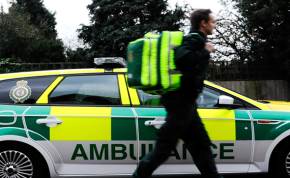
The end of shift trial, which has taken place in West Norfolk and West Hertfordshire for five weeks, has been successful against most of the key performance indicators. On the basis of this success, the trial is being expanded.
Please note, In order to provide clarity, we can confirm that the End of Shift trial is NOT suspended, the trial is actively in place. This will only vary in the event the strategic commander deems it necessary to temporarily remove the trial at surge level 3 or above, should this occur an MDT message to that effect will be issued
This article will outline the results of phase one and the plans for expansion.
Results
The data covers 2460 DSA/RRV shifts in the trial areas between the 3rd August and the 5th September. Of these shifts, 21 would have been dispatched in their last 30 minutes as they were nearest to a C1 but were protected by the trial criteria. There were only two known occasions where a trial resource was dispatched in the last 30 minutes.
Questionnaire results indicate a high level of staff satisfaction:
Main lessons
The changed call criteria appears to have had a positive impact on late finishes and late starts although, it is hard to confidently extract cause of the reduction from other factors. Overall, the perception from staff is that there has been a positive impact.
Hospital delays have a big impact on late finishes.
Without the trial, the likelihood of being assigned a C1 would have been around 1:100 shifts. The trial reduced this to around 1:1000 shifts. This should hopefully reduce the perceived risk of getting that ‘late C1’ and thus give confidence to clear and return to base, further reducing late finishes.
It is important for crews to sign on promptly at the beginning of their shift as this significantly helps protect off-coming crews from late jobs.
Further feedback
There have been many constructive comments and suggestions, in particular via the trial questionnaire. Some of these can be worked into later phases of the trial, others can be considered by the operational processes working group for further iterations for managing late finishes, or for tackling other issues, such as out of area working.
The cause of late finishes is multi-factorial. As some have rightly pointed out, this particular trial will do nothing to resolve some of them (e.g. hospital delays) where solutions will be more complex and involve other organisations. There is no ‘silver bullet’ but in the meantime, we can make steps to address issues that are more within our control, this trial being one of those steps.
Trial expansion
The trial will expand to three more phases. By November, the whole Trust will be included.
These phases are:
|
Phase 2 |
Mon 13 Sep - Mon 11 Oct (4 weeks) |
|
Expanding to include: |
Norfolk and Waveney STP Hertfordshire and West Essex STP |
|
Phase 3 |
Mon 11 Oct – Mon 8 Nov (4 weeks) |
|
Expanding to include: |
Mid and South Essex STP Suffolk and North Essex STP Chelmsford AOC |
|
Phase 4 |
Mon 8 Nov – Mon 29 Nov (3 weeks) |
|
Expanding to include: |
Cambridgeshire and Peterborough STP Milton Keynes, Bedfordshire and Luton STP |
This staged expansion will allow us to test on a larger scale to ensure that we can manage anticipated possible issues (e.g. pressure on clinical oversight) but also to check for unanticipated issues that might only become apparent when upscaling.
What happens then?
As mentioned in previous articles here on NTK, this trial is part of an iterative PDSA process. The operational processes group will be considering what the next iteration should be to further reduce late finishes whilst balancing staff wellbeing and safety against the needs to maintain patient safety.
Want to know more?
As with the first phase, there will be specific briefings for those involved in the trial, including road staff and managers in the trial areas, as well as all AOCs. You can also find out more information by visiting our Frequently Asked Questions page.
There is also a dedicated email address eostrial@eastamb.nhs.uk which you can use to ask any questions or provide feedback throughout and after the trial.
Published 9th September 2021